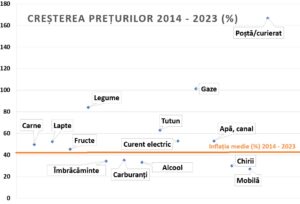 Finance Minister Ionut Misa announced on Wednesday evening in an interview for Antena3 that the Government will introduce a „solidarity tax” applied to employers, depending on the salary fund.
Finance Minister Ionut Misa announced on Wednesday evening in an interview for Antena3 that the Government will introduce a „solidarity tax” applied to employers, depending on the salary fund.
„There will be one more tax, basically we shall call it a solidarity tax, basically this is what we discuss, and we have to see exactly what the final decision will be, that is 2% that will fall to the employer. (…) The tax is paid by the employer on the salary fund. (…) It is a tax that applies to the salary fund, which cannot be eliminated or merged with other categories of contributions”- said the Minister of Finance.
He justified the decision of the ruling coalition on this tax both by the fact that we are bound by a European directive and by the discussions with the unions:
„There have been many discussions with the trade unions that were saying: there will be no responsibility left to the employer. If the employer must pay for the employee but will not be responsible from this point of view, that will create a problem for the employee himself. Leave some taxes to the employers as well so that you can turn to them, then you can take some coercive measures so that they are liable to the state budget if not paying that amount. And I said ok, we also transfer part of these contributions to the employers so that they also have a responsibility towards the state budget”- explained Ionut Misa.
The minister claims that Romania is bound by a European directive to also impose a tax on the employer, given that Romania has just elaborated the legislation for transferring all taxes from the employer to the employee:
„There is a European directive that forces us to apply a certain percentage of the salary fund. This tax cannot be eliminated in any way (…) It is a European directive that regulates a certain tax on the salary fund”- says minister Ionut Misa.
The minister did not give any detail, but the directive to which he might refer is 80/987 / EC / 1980, although the European document refers to something totally different: to the salary guarantee fund in the case of a company insolvency – that is money that the state cannot touch.
The Finance Minister also announced a cut in taxes on all types of income, from 16 to 10%.
„As of next year, the tax will decrease from 16% to 10% for all incomes but the measure of tax exemption for salaries of up to RON 2,000 will no more be implemented during this period and before the end of the year. The Government also maintains the decision to transfer the full social contributions from the employer to the employee”- the official said.
The Minister of Finance’s statements come in the context in which a PSD-ALDE coalition meeting took place on Wednesday morning and the action strategy for the next months and the measures for the 2018 budget have been established. Leaders Liviu Dragnea and C.P. Tariceanu refused to answer the questions about tax changes.
In addition, the „solidarity tax” was among first ones rejected by Prime Minister Tudose a few weeks after taking the office: „We can consider it discussed and closed,” Prime Minister Mihai Tudose said on July 25.









